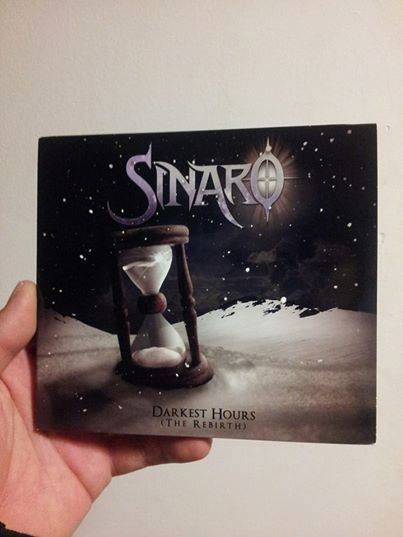Gus Sinaro is one busy dude. Along with his six-string and vocal duties with melodic metal hessians Symphony Of Malice, Gus gives guitar lessons, pimps Hughes & Kettner, Ernie Ball, and BBE products, and records YouTube play-though sessions of various SoM jams. If anyone would have an excuse to put their feet up, dive into a plate of wings, and waste a weekend catching up on The Walking Dead, it’s Mr. Sinaro.
Except he didn’t, choosing to write/record/release a solo record instead.
Darkest Hours (The Rebirth) is a collection of songs that tread some of the same ground as Gus’ full band while stripping away certain aspects, namely the balls-to-the-wall aggression and speed that make up Malice’s thrash-y trappings. Most of the material contained in these ten songs crunches along with mid-tempo groove overlaid with melodic guitar work and the cleaner side of the Jeckyl-and-Hyde vocal approach Sinaro uses in Symphony Of Malice. Opening with “Bullet Through Your Head”, the lineage is obvious. Nick Bellmore’s [Toxic Holocaust] double-bass grind rumbles under a single-note guitar melody with vocals that work around the instrumental parts, harmonies included. “Sky Above” adds a rock vibe and use of note intervals to push and pull the listener along. Track three, “No Salvation” features a nice contrast between an upbeat verse and stripped down chorus, the drums laying back to feature a bluesy guitar run and some of Gus’ best vocals.
The middle section of the album features some of the best material, i.e. the title track and “Bleed Your Sins”, as well as a few risks. “Darkest Hours” features a rippin’, melodic guitar solo and “Bleed…” would fit in the middle of Symphony Of Malice album as a change of pace, powered by a harmonic verse riff and syncopated drumming. “The Day You Died In Me” utilizes a verse riff akin to All That Remains, circa Overcome, backed up with the best solo on the album. Sinaro’s co-conspirator in Symphony Of Malice, Joey Concepcion, joins the proceeding on track 10 to lay down some signature shred. On the flip side, “Haunt The Day” features sparse guitar and Gus singing in a lower range with a dirge-like tone. I found this to be a ‘love it or hate it’ proposition. While he does a good job vocally on most of the record the focus remains on the guitar playing. When this aspect is removed, some warts show. It isn’t a deal-breaker in the least but I found myself hitting “skip” on this track more times than not.
As a whole, Darkest Hours works well. Songs naturally flow into each other and sound as if they were written for that specific purpose. From a listener’s perspective it is beneficial somebody as talented as Gus Sinaro has the inspiration to break away from the proverbial ‘day job’ and produce material. Instead of taking unused pieces and chucking them down the Well Of Unworthy Riffage he has chosen to mold a personal statement of intent. I would recommend Darkest Hours to fans of the rock-infused side of Trivium, All That Remains, and Diecast.

